MANAGEMENT ANALYSIS OF SUPPLY CHAIN PERFORMANCE AND EFFICIENCY
DOI:
https://doi.org/10.36690/2674-5208-2021-4-76Keywords:
supply chain, management analysis, business unit, performance, efficiency, social responsibilityAbstract
The article presents the results of a study on the peculiarities of performance and efficiency analysis of supply chains. It demonstrates that the economic activities of enterprises in an increasingly dynamic external environment require prompt and comprehensive solutions, significant resource potential to respond to external and internal destabilizing factors. In turn, this promotes the integration of enterprises into various forms of organizational and economic interaction to address the tasks of ensuring their competitiveness. It has been found that channels, chains, and supply networks are the most common among such forms. It has been proved that today's scientific literature lacks methodological approaches to the management analysis of supply chains as modern integrative economic formations. The focus of modern research is identifying opportunities of management analysis to assess an individual enterprise in different areas of its activities. In this case, the basic objects of management analysis are the study of operational activities, enterprise expenses, their composition and structure, the use of production resources, and the assessment of performance results. It has been found that to date there have been only isolated publications on the use of management analysis for management assignments within channels and supply chains. To gain a deeper understanding of the issues, the paper analyses alternative views regarding the essence of the supply chain as an economic entity and elucidates the modern concept of supply chain management. The main dimensions of the supply chain have been identified: the substantive dimension, which is infrastructure and material and technical resources, and the subjective dimension, which covers businesses that interact with each other and represent its individual links. And defined the processes of planning, organization and control of the supply chain, which are subject to the modern concept of management "Supply Chain Management" (SCM). In the process of research of features of realization of toolkit of the administrative analysis for the decision of tasks of diagnostics of productivity and efficiency of supply chains the following results are received: the system of base postulates of the administrative analysis of these economic objects is formulated; levels of the administrative analysis of the supply chain are established; the basic criteria of measurement of productivity and efficiency of a chain are defined; assessment indicators of degree of achievement of its purposes are identified; the conceptual algorithm of realization is offered.
Downloads
References
Bruhans’kyi, R.F. (2014). Oblik u systemi strategichnogo menedgmentu agrarnogo pidpriemnyctva. [Accounting and analysis of the strategic management of the agricultural business]. TNEU, Ternopil’, 384 p. (in Ukrainian).
Haidaienko, O. M., & Shevchuk N.S. (2015) Upravlinskyi analiz [Management analysis]. Odesa: ONEU [in Ukrainian].
Mulyk, T.O., & Hordiienko, M.I. (2017) Metodychni pidkhody do upravlinskoho analizu v umovakh intehratsiinykh protsesiv. [Methodical approaches to the management of the analysis in terms of integration processes]. EKONOMIKA. FINANSY. MENEDZhMENT: aktualni pytannia nauky i praktyky, 7, 7-19 [in Ukrainian].
Mnykh, Ye.V. (2005) Ekonomichnyi analiz [Economic analysis]. Kyiv: Tsentr navchalnoi literatury [in Ukrainian].
Tomchuk O.F. (2017) Sutnist i kontseptualni mezhi upravlinskoho obliku [Essence and conceptual limits of administrative account]. Oblik i finansy APK, no 11–12, pp. 117–122.
Farion I. D. (2009) Stratehichnyi analiz: navch. рosibnyk [Strategic analysis: navch. manual]. Ternopil: TNEU. (in Ukrainian)
Bowersox, Donald J. Supply chain logistics management 1 Donald J. Bowersox, David J. Closs, M. Bixby Cooper. p. cm.-(McGraw-Hillnrwin series operations and decision sciences)
Kristofer, M. Logistika i upravlenie tsepochkami postavok [Logistics and Supply Chain Management]. St. Petersburg: Piter, 2004
Krykavs'kyj, Ye. V. Pokhyl'chenko, O. and Fertch, M. (2017), Lohistyka ta upravlinnia lantsiuhamy postavok [Supply chain logistics and management], L'vivs'ka politekhnika, L'viv, Ukraine.
Uoters, D. Logistika: upravlenie tsepiu postavok [Logistics supply chain management]. Moscow: YuNITI, 2003.
Stok, Dzh. R., and Lambert, D. M. Strategicheskoe upravlenie logistikoy [Strategic logistics managementMoscow: INFRA-M, 2005.
Sumetsʹ, O.M. (2017). Praktyka otsinky efektyvnosti lantsyuhiv postavky [The practice of evaluating the effectiveness of supply chains]. Lohystyka: problemy y reshenyya – Logistics: problems and solutions, 1 (68), 30-33. [in Ukrainian].
Syhyda, L.O. & Syhyda, N.O. (2017). Otsinyuvannya efektyvnosti lantsyuhiv postavok: metodychnyy aspect [Evaluating Supply Chain Performance: A Methodical Aspect]. Naukovo-vyrobnychyy zhurnal «Biznes-navihator» – Business Navigator Scientific and Production Magazine, 2 (41), 63-69. [in Ukrainian].
Khendfild, R. B., and Nikols, E. L. Reorganizatsiia tsepey postavok. Sozdanie integrirovannykh sistem formirovaniia tsennosti [The reorganization of the supply chain. Creating integrated systems forming values]. Moscow: Viliams, 2003.
Chukhray N.I. (2009) Otsinyuvannya funktsionuvannya lantsyuha postavok: sutnistʹ ta kontseptualʹni pidkhody [Evaluating Supply Chain Functioning: Essence and Conceptual Approaches]. Visnyk Natsionalʹnoho universytetu Lʹvivsʹka politekhnika – Bulletin of the National University Lviv Polytechnic, 647, 276-285. [in Ukrainian].

Downloads
Published
How to Cite
Issue
Section
License

This work is licensed under a Creative Commons Attribution-NonCommercial 4.0 International License.








